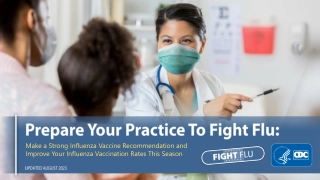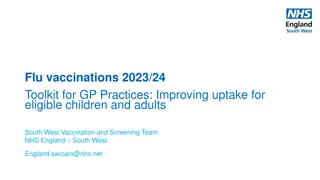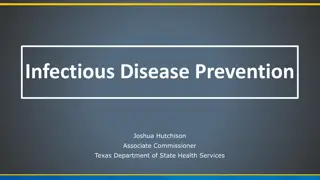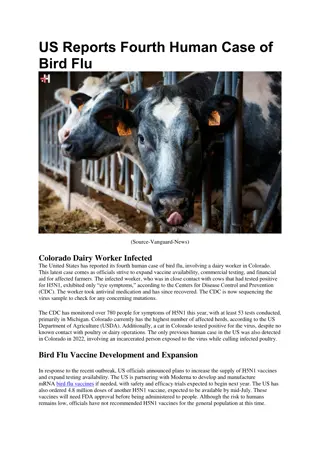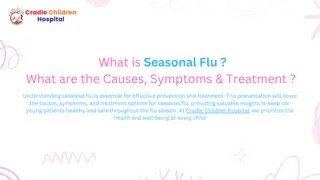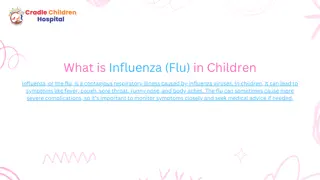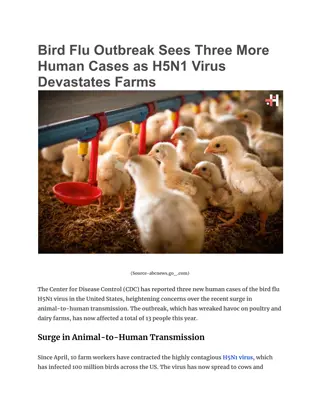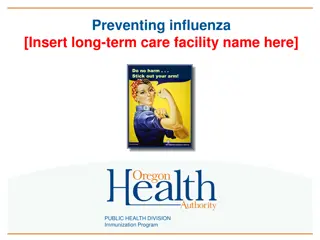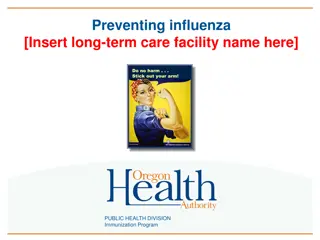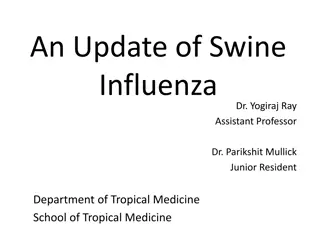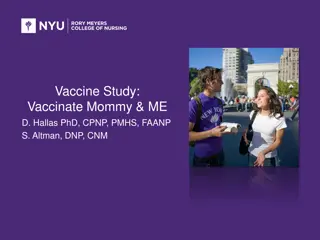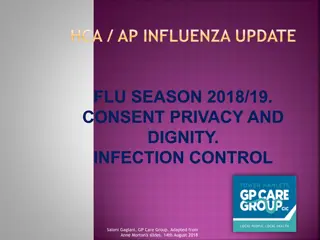
Flu: Importance of Vaccination, Symptoms, Prevention
Learn about flu, its symptoms, and how to prevent it. Understand the importance of flu vaccinations and how they can protect vulnerable individuals. Discover ways to stay healthy during the flu season, including handwashing and vaccination promotion.
Download Presentation

Please find below an Image/Link to download the presentation.
The content on the website is provided AS IS for your information and personal use only. It may not be sold, licensed, or shared on other websites without obtaining consent from the author. If you encounter any issues during the download, it is possible that the publisher has removed the file from their server.
You are allowed to download the files provided on this website for personal or commercial use, subject to the condition that they are used lawfully. All files are the property of their respective owners.
The content on the website is provided AS IS for your information and personal use only. It may not be sold, licensed, or shared on other websites without obtaining consent from the author.
E N D
Presentation Transcript
Flu champion slides 2024/25 season Provided by: NHSE NW PH Commissioning Team (Screening and Immunisation Team) Cheshire, Merseyside, Lancashire and South Cumbria england.nwsit@nhs.net
Objectives Understand flu and the importance of flu vaccinations Promote flu vaccinations Signpost eligible people to where they can get their vaccination Have the flu vaccination if you are eligible 2
Symptoms of Flu People sometimes think flu is a bad cold, but having flu can often be much worse than a cold and you may need to take time off work and stay in bed for a few days Common symptoms include: sudden onset of fever, chills, headache, muscle and joint pain and extreme fatigue dry cough, sore throat and stuffy nose in young children, symptoms such as diarrhoea and vomiting may be seen Some people are more vulnerable to the flu virus. For them, it can increase the risk of developing more serious illnesses such as bronchitis and pneumonia or can make existing conditions worse. In the worst cases, flu can result in a stay in hospital, or even death 3
Who is affected? Anyone can catch flu, but it can affect some more than others and risk serious illness or death in: newborn babies elderly people pregnant women people with underlying diseases/health problems people with impaired immunity 5
How do you get flu? Flu is passed from person to person by droplets created when someone with the infection sneezes or coughs You can also catch it by touching a surface where the virus has been left People with mild or no symptoms can still infect others Flu spreads easily when people are gathered together indoors during the winter months 6
How can flu be prevented? Have the flu vaccination if you are eligible 7
Handwashing Handwashing is one of the easiest ways to protect yourself and others from illnesses such as flu, COVID-19 and food poisoning Washing your hands should take as long as it takes to sing Happy Birthday twice around 20 seconds You should routinely wash your hands frequently 8
The flu vaccination The flu vaccine stimulates your body's immune system to make antibodies to attack the flu virus Antibodies are proteins that recognise and fight off germs, such as viruses, that have invaded your blood If you're exposed to the flu virus after you've had the flu vaccine, your immune system will recognise the virus and immediately produce antibodies to fight it It may take 7 to 14 days for your immunity to build up fully after you have had the flu vaccination 9
Types of flu vaccination There are several different flu vaccinations available each year Some vaccines are less effective in certain people, for example the elderly. It is therefore important that each group is offered the most appropriate vaccine Vaccines are recommended for different groups based on the evidence regarding quality and effectiveness of the vaccines Most years, one or two strains of type A flu circulate as well as type B. The flu vaccines contain 2 type A strains and 2 type B strains 10
Who can have the flu vaccination All children aged 2 and 3 years old All school aged children from reception to year 11 People aged 65 years and over Pregnant women People with a learning disability People who are very overweight with a body mass index (BMI) of over 40 11
Who can have the flu vaccination (continued) Chronic (long-term) respiratory diseases, such as asthma, chronic obstructive pulmonary disease (COPD) or bronchitis Chronic heart disease, such as heart failure Chronic kidney disease Chronic liver disease, such as hepatitis Chronic neurological conditions, such as Parkinson s disease Diabetes People with impaired immunity due to diseases or treatments 12
Who can have the flu vaccination (continued) People with lowered immunity due to diseases or treatments e.g. cancer treatment People living in a long-stay residential care homes or nursing homes Carers Front line health, hospice and social care workers with patient contact 13
Flu can be serious for pregnant women and babies A pregnant woman who catches flu is more likely to need admission to hospital than a woman who isn t pregnant Flu can be serious for unborn and newborn babies Flu can lead to premature birth, low birth weight, still birth or even death in the first few weeks of life 14
Benefits to the baby of pregnant women being vaccinated Flu vaccination during pregnancy reduces the chance of the pregnant woman catching flu and passing the virus to the baby The baby will also develop some immunity to flu as antibodies are passed from the woman to her baby through the placenta This will protect the baby for its first few months of life The mother will continue to be protected throughout the flu season, and so be less likely to pass flu onto the newborn baby 15
Timing The start of the programme for most adults has moved to the beginning of October. Most flu vaccinations should be completed by the end of November, closer to the time that the flu season commonly starts It is preferable to vaccinate people closer to the time when the flu virus is likely to circulate (which typically peaks in December or January), as this will provide the best protection during the highest risk period A small number of adults may be offered the flu vaccination in September. In exceptional circumstances, there may be a clinical decision to bring forward vaccination to September Pregnant women can be offered the flu vaccination from the beginning of September It's always worth getting vaccinated, even if there have already been outbreaks of flu 16
Flu fact 1 side effects It s impossible to get flu from the flu vaccine because the adult vaccine doesn t contain live viruses, and the children s nasal spray vaccine has been weakened to prevent it from causing flu Those having an injected flu vaccine may get a sore arm at the site of the injection, a low-grade fever and aching muscles for a day or 2 after the vaccination Children are usually offered the flu vaccination in a nasal spray. This may cause a runny or blocked nose, headache, general tiredness and some loss of appetite. However, these are much milder than developing flu or complications associated with flu. Serious side-effects are uncommon 17
Flu fact 2 - effectiveness Some people confuse having a cold with having flu. Lots of infections are around in winter, and some have similar symptoms to flu Not everyone will develop immunity from the vaccine, so despite having the flu vaccination some people will still be at risk and may catch flu This makes it really important that as many eligible people as possible are vaccinated to reduce the spread of the disease and protect those who remain at risk 18
Flu fact 3 - frequency Eligible people need to have the flu vaccination every year The viruses that cause flu can change, so you need a vaccination that matches the new viruses each year The vaccine usually provides protection for the duration of that year's flu season 19
Flu fact 4 - allergies Almost everybody can have the flu vaccine, but people should not be vaccinated if they have ever had a serious allergy to the vaccine, or any of its ingredients Most people who are allergic to eggs can have the flu vaccination. They should discuss it with a healthcare professional 20
Flu fact 5 protection The flu vaccines used in the national NHS programme have a good safety record The vaccines are thoroughly tested Millions of doses are given every year 21
Flu fact 6 porcine gelatine The children s nasal spray contains gelatine that comes from pork as one of its additives as it was found to be the most effective stabiliser The nasal spray is the most effective vaccine for children Some people may decline the nasal spray vaccine due to the porcine gelatine content Children should have the injectable vaccine as an alternative if they decline the nasal spray due to the porcine gelatine content https://www.gov.uk/government/publications/childrens-flu-vaccination-programme- nasal-flu-vaccine-and-porcine-gelatine 22
How to get the flu vaccination GP practice/PCNs Community pharmacies School vaccination teams Midwives Employers Outreach services e.g. Substance misuse treatment services and HIV sexual health services 23
How you can help Promote the flu vaccine Talk to people about flu vaccinations Provide accurate facts about flu and flu vaccinations Tell people where to get the flu vaccine Have the flu vaccination if you are eligible Wash your hands regularly Catch it. Bin it. Kill it. 24
Resources information Health Publications leaflets and posters www.healthpublications.gov.uk Campaign Resource Centre leaflets, posters and social media resources https://campaignresources.phe.gov.uk/resources/ 25
Thank You @nhsengland company/nhsengland england.nhs.uk 26

